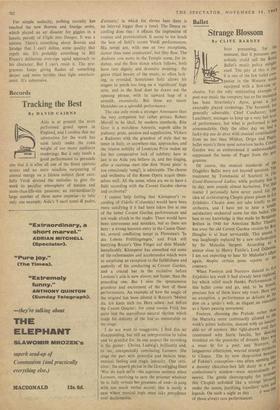Records
Tracking the Best
By DAVID CAIRNS
d'amante,' in which for eleven bars there is no interval bigger than a tone). The Decca re- cording does this: it effaces the impression of routine and provincialism. It seems to me much the best of Solti's recent Verdi performances.
His tempi are, with one or two exceptions, slower than most conductors', but they flow. The Andante con moto in the Temple scene, for in- stance, and the flute dance which follows, both have rare dignity and dramatic meaning: the grave ritual beauty of the music, so often lack- ing, is revealed. Sometimes Solti allows his singers to perch too long on a 'significant' high note, and in the final duet he draws out the opening phrase, with its upward leap of a seventh, excessively. But these are minor blemishes on a splendid performance.
The cast only needs a stronger Amonasro than the very competent but rather prosaic Robert Merrill to be ideal, by modern standards. Rita Gorr is a matchless Amneris, superb alike in jealousy, pride, passion and supplication, Vickers a Radames with the grandeur of style that no tenor in Italy, or anywhere else, approaches, and the intense nobility of Leontyne Price makes up for her comparative lack of subtlety; here at last is an Aida you believe in, and her singing, after a cautious start (the first 'Numi pieta' is too consciously `sung'), is admirable. The chorus and orchestra of the Rome Opera acquit them- selves well. All the same, when are we to have a Solti recording with the Covent Garden chorus and orchestra?
I cannot help feeling that Klemperer's re- cording of Fidelio (Columbia) would have been more satisfying if it had been taken live at one of the better Covent Garden performances and not made afresh in the studio. There would have been unevenness and mistakes, but so there are here: a wrong bassoon entry in the Canon Quar- tet, several conflicting tempi in Florestan's 'In des Lebens Friihlingstagen,' and Frick still hurrying Rocco's 'Den Finger auf dem Munde' inexplicably. Klemperer has smoothed out some of the rallentandos and accelerandos which were so surprising an exception to the faithfulness and austerity of his conducting at Covent Garden, and a crucial bar in the recitative before Leonore's aria is now slower, not faster, than the preceding one. But I miss the spontaneous grandeur and excitement of the best of those performances. An example of how the magic of the original has been diluted is Rocco's `Meinst du, ich kann nich ins Herz sehen' just before the Canon Quartet: for some reason Frick has quite lost the marvellous natural rhythm which made his delivery of the line so memorable on the stage.
I do not want to exaggerate; I find this set disappointing, but still an interpretation to value and be grateful for. In one respect the recording is the gainer; Christa Ludwig's brilliantly and, to me, unexpectedly convincing Leonore. She sings the part with powerful and incisive tone, musical feeling and tragic intensity. One criti- cism: the superb phrase in the Gravedigging Duet 'Wer du auch sei'st—the supreme moment when I.eonore, resolving to save the prisoner whoever he is, fully reveals her greatness of soul—is sung with too much verbal accent; this is surely a case where musical logic must take precedence over declamation.






































 Previous page
Previous page